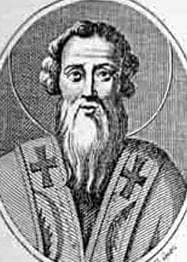The musings and meandering thoughts of a crotchety old man as he observes life in the world and in a small, rural town in South East Nebraska. I hope to help people get to Heaven by sharing prayers, meditations, the lives of the Saints, and news of Church happenings. My Pledge: Nulla dies sine linea ~ Not a day without a line.
23 November 2024
St Gregory of Girgenti, Bishop & Confessor
Saint Gregory of Girgenti, also known as Gregory of Agrigentum or Gregorio II di Agrigento, was a prominent figure in the Catholic Church during the 7th century. He served as the Bishop of Girgenti, a city located in Sicily, Italy. Known for his biblical commentary and dedication to teaching, Saint Gregory became renowned as a knowledgeable and influential spiritual leader. Born in Girgenti, Sicily, knowledge about Saint Gregory's early life is limited. It is believed that he received a solid education from a young age, particularly in the study of Scripture. As he grew older, his passion for understanding and teaching the Bible intensified, leading him to pursue a life dedicated to God. In his capacity as Bishop of Girgenti, Saint Gregory was respected for his wisdom and ability to explain complex theological concepts in simple terms. One of his noteworthy accomplishments was his commentary on the book of Ecclesiastes, which has survived to this day. This commentary provided valuable insights into the spiritual meaning and messages conveyed in the texts, making it accessible to a wider audience. Saint Gregory's commitment to teaching the Scriptures in a plain manner, aimed at ordinary individuals, distinguished him as an exceptional communicator. His teachings were not only appreciated by the clergy but also resonated with ordinary people seeking guidance and understanding. He played a significant role in strengthening the faith and spiritual understanding of the local community. Despite his notable contributions, Saint Gregory's representation in art or symbols is not well-documented. Nevertheless, his impact on the region and the Church's teachings is undeniable. Saint Gregory of Girgenti passed away around the year 638, having lived a life dedicated to serving God and his flock. His death is believed to have been due to natural causes. Recognizing his virtues and the impact he had on the people of Girgenti, the Catholic Church proclaimed him a saint. However, the exact date and circumstances of his canonization are unknown, as it occurred prior to the formal establishment of the Congregation for the Causes of Saints. Though Saint Gregory of Girgenti remains somewhat obscure in the wider Catholic Church, his contributions to biblical interpretation and teaching continue to be recognized on a local level. His feast days are celebrated on November 23 and November 25 in the Archdiocese of Agrigento, Italy, as a tribute to his devotion and enduring influence on the faith of the community he served. While not specifically associated with a particular patronage, Saint Gregory of Girgenti's commitment to education and explaining Scripture may make him an appropriate patron saint for teachers, scholars, or those seeking spiritual guidance through the study of the Bible.
Subscribe to:
Post Comments (Atom)

No comments:
Post a Comment
Comments are subject to deletion if they are not germane. I have no problem with a bit of colourful language, but blasphemy or depraved profanity will not be allowed. Attacks on the Catholic Faith will not be tolerated. Comments will be deleted that are republican (Yanks! Note the lower case 'r'!), attacks on the legitimacy of Pope Leo XIV as the Vicar of Christ, the legitimacy of the House of Windsor or of the claims of the Elder Line of the House of France, or attacks on the legitimacy of any of the currently ruling Houses of Europe.